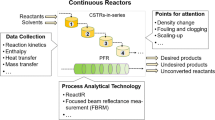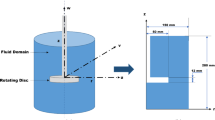Abstract
The work expenditures for both perfect and imperfect separation processes are well known for the reversible case; yet such a description is often far from reality. Real processes operate at finite times and non-zero rates leading to an additional, irreversible energy expenditure. This paper employs an idealized van t'Hoff chamber as a theoretical model to derive lower bounds for the irreversible work in real separation processes such as membrane separation. Methods of optimal control for open systems and nonlinear programming of averaged problems are used to calculate the optimal mass transfer kinetics for the finite-time separation of binary mixtures of ideal gases.
Similar content being viewed by others
Bibliography
R. Kümmel, D. Lindenberger, W. Eichborn, Energie, Wirtschaftswachstum und technischer Fortschritt, Phys. Bl., 53, 869 (1997).
J. G. Xu, R. Agrawal, Membrane separation process analysis and design strategies based on thermodynamic efficiency of permeation, Chem. Eng. Sci. 51, 365 (1996).
F. L. Curzon, B. Ahlborn, Efficiency of a carnot engine at maximum power output, Am. J. Phys., 43, 22 (1975).
B. Andresen, R. S. Berry, A. Nitzan, P. Salamon, Thermodynamics in finite time. I. the step-carnot cycle, Phys. Rev. A 15, 2086 (1977).
G. R. Brown, S. Snow, B. Andresen, P. Salamon, Finite-time thermodynarnics of a porous plug, Phys. Rev. A 34, 4370 (1986).
P. Salamon, A. Nitzan, Finite time optimizations of a newton's law Carnot cycle, J. Chem. Phys. 74, 3546 (1981).
M. J. Ondrechen, B. Andresen, M. Mozurkewich, R. S. Berry, Maximum work from a finite reservoir by sequential Carnot cycles, Am. J. Phys. 49, 681 (1981).
L. I. Rozonoer, A. M. Tsirlin, Optimal control of thermodynamic processes I., Autom. Remote Control USSR 44, 55 (1983), translated from Avtomatika i Telemekhanika.
L. I. Rozonoer, A. M. Tsirlin, Optimal control of thermodynamic processes II., Autom. Remote Control USSR, 44 209 (1983), translated from Avtomatika i Telemekhanika.
L. I. Rozonoer, A. M. Tsirlin, Optimal control of thermodynamic processes III., Autom. Remote Control USSR, 44, 314 (1983), translated from Avtomatika i Telemekhanika.
L. I. Rozonoer, Thermodynamics and Regulation of Biological Processes, de Gryter, Berlin, 1984.
P. Salamon, Y. B. Band, O. Kafri, Maximum power from a cycling working fluid, J. Appl. Phys. 53, 197 (1982).
B. Andresen, R. S. Berry, M. J. Ondrechen, P. Salamon, Thermodynamics for processes in finite-time, Acc. Chem. Research 17, 266 (1984).
O. C. Mullins, R. S. Berry, Minimization of entropy production in destillation, J. Phys. Chem. 88, 723 (1984).
L. I. Rozonoer, A. V. Rudenko, A. M. Tsirlin, Theor. Osn. Chim. Tech. 362 (1984) (in Russian).
A. G. Kuznetov, A. V. Rudenko, A. M. Tsirlin, Optimal-control in thermodynamic systems with sources of finite-capacity, Automation and Remote Control USSR 46, 693 (1985).
K. H. Hoffmann, S. J. Watowich, R. S. Berry, Optimal paths for thermodynamic systems: The ideal diesel cycle, J. Appl. Phys. 58, 2125 (1985).
S. J. Watowich, K. H. Hoffmann, R. S. Berry, Intrinsically irreversible light-driven engine, J. Appl. Phys., 58, 2893 (1985).
S. J. Watowich, R. S. Berry, Optimal current paths for model electrochemical systems, J. Phys. Chem. 90, 4624 (1986).
J. W. Warner, R. S. Berry, On the thermodynamics of fuel synthesis, J. Phys. Chem. 91, 2216 (1987).
V. A. Mironova, A. M. Tsirlin, Y. B. Samarin, Gaseous-mixtures separation processes thermodynamic analysis, Khimicheskaya Promyshlennost 486 (1988) (in Russian).
A. M. Tsirlin, Cyclic Processes and Cyclic Regimes, Mashinostroenie, Moscow, 1985 (in Russian).
V. N. Orlov, R. S. Berry, Power output from an irreversible heat engine with a nonuniform working fluid, Phys. Rev. A 42, 7230 (1990).
V. N. Orlov, R. S. Berry, Estimation of minimal heat consumption for heat-driven separation processes via methods of finite-time thermodynamics, J. Chem. Phys. 95, 5624 (1991).
V. A. Mironova, A. M. Tsirlin, V. A. Kazakov, S. R. Berry, Finite-time thermodynamics: Exergy and optimization time-constrained processes, J. Appl. Phys. 76,629 (1994).
S. Sieniutycz, J. S. Shiner, Thermodynamics of irreversible processes and its relation to chemical engineering: Second law analyses and finite time thermodynamics, J. Non-Equilib. Thermodyn. 19, 303 (1994).
K. H. Hoffmann, J. M. Burzler, S. Schubert, Endoreversible thermodynamics, J. Non-Equilib. Thermodyn. 22, 311 (1997).
K. H. Hoffmann, J. M. Burzler, A. Fischer, M. Schaller, S. Schubert, Endoreversible dynamics, accepted for publication in the Journal of Non-Equilibrium Thermodynamics (2003).
Z. Fonyo, Thermodynamic analysis of rectification: I. Reversible Model of rectification, Int. Chemical. Eng. 14, 18 (1974).
M. Schaller, K. H. Hoffmann, G. Siragusa, P. Salamon, and B. Andresen, Numerically optimized performance of diabatic distillation columns, Comput. Chem. Eng. 25, 1537 (2001).
W. S. W. Ho, K. K. Sirkar, Membrane Handbool, van Nostrand Reinhold, New York, 1992.
W. J. Koros, G. K. Fleming, Membrane-based gas separation, J. Membrane Sci. 83, 1 (1993).
V. A. Kazakov, R. S. Berry, Estimation of productivity, efficiency, and entropy production for cyclic separation processes with distributed working fluid, Phys. Rev. E 49, 2928 (1994).
I. M. Britan, I. L. Leites, T. N. Vasilkovskaya, Membrane technology of mixed-gas separation: Thermodynamic analysis for feasibility study, J. Membrane Sci. 55, 349 (1991).
V. Malyh, Thermodynamic restrictions and efficiency of isothermal separation processes, in: VINITI, vol. B87, 1987, p. 12.
M. H. Rubin, Optimal configuration of a class of irreversible heat engines I, Phys. Rev. A 19, 1272 (1979).
M. J. Ondrechen, M. H. Rubin, Y. B. Band, The generalized carnot cycle — a working fluid operation in finite-time between finite heat sources and sinks, J. Chem. Phys. 78, 4721 (1983).
F. Reif, Statistische Physik und Theorie der Wärme, de Gruyter, Berlin, 1987.
K. Stephan, F. Mayinger, Thermodynamik — Band 1 Einstoffsysteme, Springer, Berlin, 13th edition, 1990.
L. I. Rozonoer, A. M. Tsirlin, Optimal control of thermodynamic processes III., Avtomatika i Telemekhanika, 50 (1983) (in Russian).
J. Kardos, A. M. Zirlin, B. Böhme, K. Lorenz, A. W. Sajew, Dynamische Grundoperationen der Verfahrenstechnik. Modellierung und optimale Steuerung, Akademie Verlag, Berlin, 1984.
A. M. Tsirlin, Optimal Cycles & Cyclic Regimes, Energoatomizdat, Moscow, 1985.
A. M. Tsirlin, Optimality conditions for solution of averaged problems of mathematical-programming, Doklady Akademii Nauk SSSR, 323, 43 (1992), (in Russian).
A. De Vos, Endoreversible thermodynamics and chemical reactions, J. Phys. Chem. 95, 4534 (1991).
A. M. Tsirlin, Optimal control of irreversible heat and mass transfer processes, Technical Cybernetics, 171 (1991).
Author information
Authors and Affiliations
Rights and permissions
About this article
Cite this article
Amelkin, S.A., Tsirlin, A.M., Burzler, J.M. et al. Minimal Work for Separation Processes of Binary Mixtures. Open Systems & Information Dynamics 10, 335–349 (2003). https://doi.org/10.1023/B:OPSY.0000009555.63816.86
Issue Date:
DOI: https://doi.org/10.1023/B:OPSY.0000009555.63816.86




